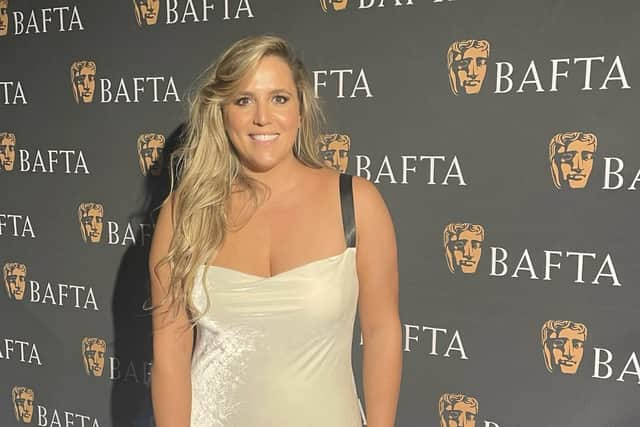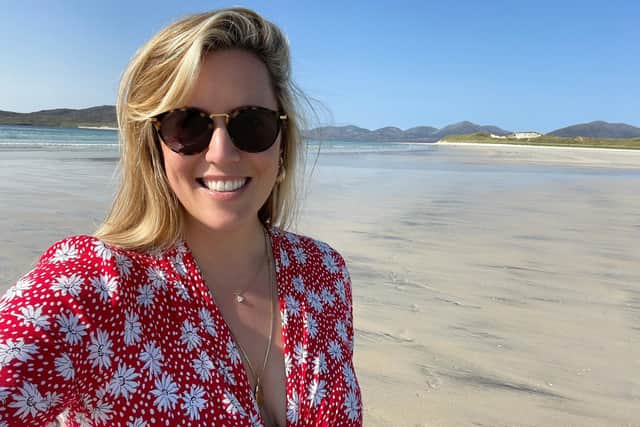Egg freezing: Scottish woman shares her story to raise awareness about fertility procedure


The female body can seem like a total mystery, even to those who own one.
It’s only in recent years that there’s been an increasing frankness about the menopause and periods.
Advertisement
Hide AdAdvertisement
Hide AdHowever, what about ovulation, and the process of egg freezing?


Most people have heard of it, perhaps via celebrities, like Rita Ora or January Jones, who’ve shared their experiences in the past, but hardly any of us would have the vaguest idea about what it actually involves.
That’s why London-based Scot and managing director of Bioeffect, Amy Irving, 39, wants to share her story, after recently completing her 10-month egg freezing journey.
“I started thinking about it around five years ago, but I didn’t feel the sense of u rgency, as I think I subconsciously thought I might meet someone in the next few years, so there wasn’t a rush to spend money on something I may not need,” she says. “There also wasn’t much information out there so I didn’t really know the data on the advantages of egg freezing at a younger age. That’s why I am so eager to ensure the information is more available to women now. Early last year was the first time I felt aware of the effect of time on my fertility, so I started researching costs, clinics and the process, all of which was confusing and at times terrifying”.
The average age to have a baby in the UK is 30 and, although there are plenty of outliers, pregnancy does get less likely as you get older. At birth, women have one to two million eggs. By the time they’re 37, there’s 25,000 and they continue to slowly dwindle as time goes on. It’s suggested that egg freezing is best done while you’re still in your twenties.
Irving wasn’t sure she wanted to be a parent, but she saw it as an ‘investment’ in herself.
“I’ve always wanted to be a mum but I have also always been very ambitious, I never thought it would be one or the other and so for the last 15 years I prioritised my career, which I don’t regret, as I have had incredible jobs, travelled the world and now have the job I used to dream about,” she says. “However, I realised that if I did want to have the option of children in the future, I would have to go down the egg freezing route. I’ve had some serious relationships but nothing that made the leap to marriage, babies etc. I knew I didn’t want to go down the sperm donor and IVF route so egg freezing was a way in which to have some type of insurance policy in case I did meet the man I want to have children with”.
Irving signed up with London’s private Lister Fertility Clinic, under the care of consultant Gavin Kemball, as the procedure is only available on the NHS in some circumstances, such as if you’re undergoing chemotherapy. “I always felt like I was in safe, expert hands and I knew he truly wanted the best outcome for me. I never felt like I was on a conveyor belt”, she says.
Advertisement
Hide AdAdvertisement
Hide AdThe medical process involves taking IVF drugs to stimulate the ovaries, then eggs are harvested under general anaesthetic or sedation, before being frozen and stored. It’s a relatively new procedure, so Irving went into the process with limited knowledge.
“I remember calling the nurse to book my pre-assessment and asking her how long the treatment would last and how often I would need to be in the hospital, and this was after handing over £10k. I went into the whole thing completely blind but also feeling I had read as much literature as I could,” says Irving. “By the time I did my second round I knew the process. I also knew to be kinder to myself and set no expectations”.
Before the treatments started, all she had really worried about was the needles.
“This is what most daunted me - not the procedure itself or the side effects of the drugs, but the injecting of them. After upwards of 150 injections and multiple blood samples I can safely say I no longer fear needles,” she says.
Irving ended up having three rounds of treatment. She originally thought that it would take the same number of consecutive months, but she ended up having to take breaks for mental and physical reasons. Although she got fewer eggs than she'd hoped for in her first round, Irving’s goal was to preserve 20, which is supposed to give you the best chance for a viable pregnancy in the future.
However, whether she’ll ever use them is still in the balance.
“I’m unsure. I really like my life and freedom. However, I also know that if Prince Charming rang the doorbell I would be absolutely delighted that I had my insurance policy on ice,” she says. “On an emotional level the biggest gift has been the head space to allow me to really think. It is hard to make that honest decision when you have a ticking clock hanging over your head. Now I have the space to allow myself to decide. I don’t have a deadline, as the beauty of having the option is that I no longer feel the pressure. Most of the time I think I am still 32, now I get to act like it”.
The process has been a pricey venture. Although the original outlay was £10k, there are other costs to factor in.
Advertisement
Hide AdAdvertisement
Hide Ad“I haven’t added up all the receipts yet, I think I am a bit scared, but I know I don’t have much change out of £20k,” says Irving. “The costs are not straight-forward. The hospital will give you the ‘treatment cost’, which will most likely include; nurses appointments, scans while undergoing treatment, the egg retrieval itself and the nursing care in the clinic as a day patient. What it won’t include is: any medication (that will, and should, be decided on a case-by-case basis as there are different protocols), blood tests throughout the cycle and any fertility MOT/testing prior to starting treatment”.
Despite this, she feels it’s well worth it, and wants to raise awareness about the procedure by being open about it, including on her Instagram account (@amyirving).
“I think every woman should have the opportunity to freeze their eggs in their twenties. If they did it at this age, they would most likely only need one round, which takes four weeks, to get enough eggs,” she says. “The issue is accessibility as it is an expensive process and only available privately. Many companies now offer it to their female employees as one of their perks, but it is still mostly the big American companies like Spotify and Google”.
As well as the insurance policy, Irving has also been left with a deeper understanding of her biology.
“Going through this process has made me in awe of the female body. It truly is magnificent. Not only because it can grow a life but because of what it does every day, every month without most of us really knowing what is going on,” she says. “Learning about this has been one of the best gifts of the whole experience and I believe girls in school should be taught what is happening in their bodies, it really is magical”.
Comments
Want to join the conversation? Please or to comment on this article.